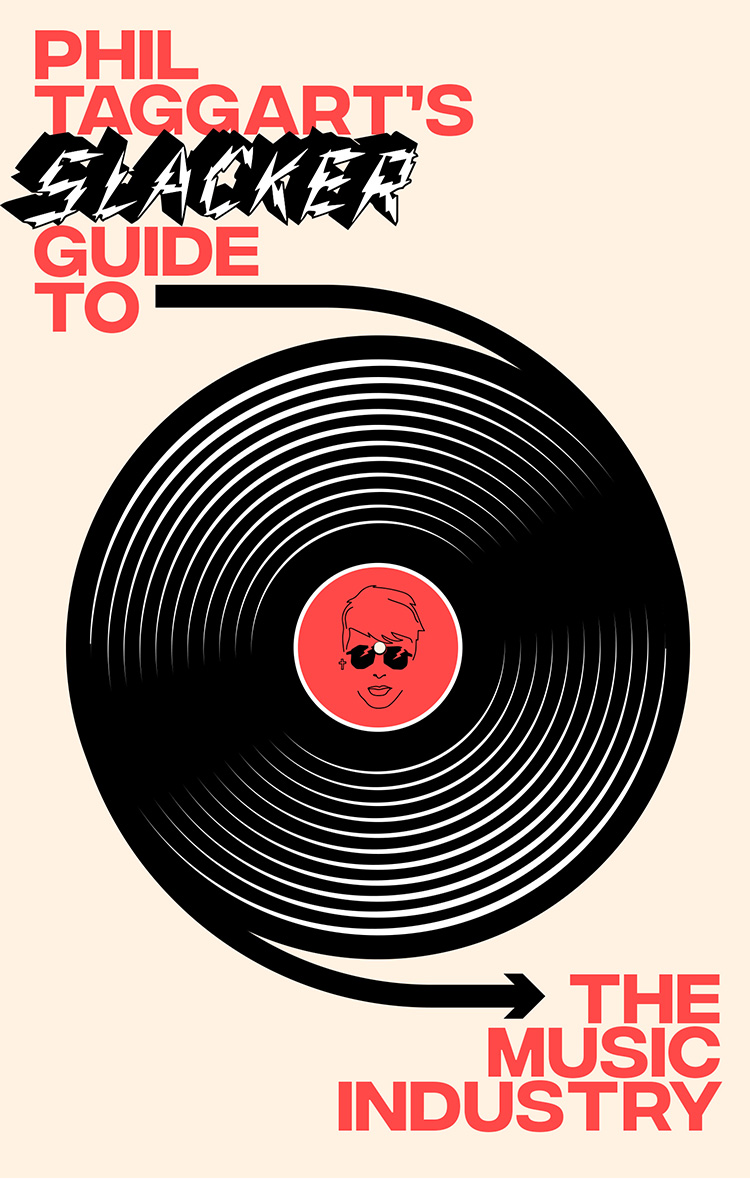Like many broadcasters working within music, Phil Taggart is himself a musician. It’s something that has granted the Northern Irish BBC Radio 1 presenter a considerable amount of leeway and insight when it comes to his new book, Phil Taggart’s Slacker Guide to The Music Industry.
With contributions from the likes of Run The Jewels, Biffy Clyro, Charli XCX , Wolfe Alice, Slaves and more, it’s a book that, in “using the knowledge of the people who’ve navigated the difficult waters of the music industry to ask all the questions you never even knew you had to ask”, tackles everything from music videos, management and building a fanbase, to image, publishing, PR and more.
Ahead of appearing at Belfast’s Oh Yeah Music Centre on Tuesday, May 7 to discuss and read from the book, Taggart talks to us about how and why it came to be.
___
You were a musician before you entered the world of broadcasting. Do you think you could have written this book without having been involved in making, playing and promoting it yourself?
There’s no way I could have written a book about the music industry without playing in bands for near 10 years. It’s important to set out and make your own path with your music, I do think there has always been a huge knowledge gap. The frustration of recording a piece of music and not knowing what the fuck to do it is real. You can’t expect a kid picking up an instrument who wants to emulate and beat their heroes to know every single facet of the music industry, even the simple bits. Making your own mistakes is important and this is only a guide to help you to untangle the wires, it’s not a short cut.
Many first books stem from a Eureka point, that usually translates to “Alright, fuck it. I’m going to do it.” When was your moment and what were the first steps that you took to make it a reality?
I keep telling people that I was really inspired by Davina McCalls Fitness DVDs. How could you not be? In reality, I was getting a lot of questions from artists about what the next step was for their career. I felt sort of helpless, I could help a little but ultimately I only know what I know but I did have access to a lot of people who were experts. The book started as a pamphlet and grew to 368 pages. It could probably be 100 times bigger, it’s such an endless topic to cover, but you gotta call it quits at some point and be happy with what you’ve done.
You collaborated with Belfast broadcaster and journalist Steven Rainey on the book. Tell us about how input informed the tone and gist of the book.
Myself and Steven worked together on the BBC Music Introducing show many years ago. We are great friends and have shared history in playing in bands that tried to navigate the choppy music industry waters. I’d never written a book before and Steven has a really great way with narrative and is very good editorially. He took my ramblings and made them legible and added some really brilliant writing himself.
Aside from the clear-cut advice contained therein, the structure of the book really adds to it. Did you spend a lot of time on that side of things?
There’s a danger in writing anything about the music industry of it being boring as fuck. The one thing myself and Steven spoke a lot about was how to make this an interesting read. Breaking up each chapter with Top 10 lists, illustrations and ridiculous flights of fancy. I hoped that it would be a book that would be able to read cover to cover for people mildly interested in the music industry and something that could be opened at a particular chapter for artists who needed a little help!
The music industry is, of course, a constantly evolving thing. How did you ensure that the contents of the book had an evergreen quality to them, that won’t require a re-write every two to three years?
There is no possible way to make a timeless book about the music industry. Considering most labels and artists teams barely know what they are doing week to week, it’s hard to be conclusive and up to date. There are a lot of parts of the book that will hold true for the foreseeable but also on the flip side some parts that will date in years to come. If people enjoy the book and it does well I’ll do updates but that remains to be seen.
There are some really well-known names featured in the book, which will undoubtedly entice people to pick it up. Which is your favourite and why?
My favourite was the interview with Run The Jewels. I managed to wangle my way into their dressing room before their biggest ever UK show at Brixton Academy. This could very easily have been a ‘get the fuck out we are preparing’ situation. They couldn’t have been any better. They gave really solid advice, and were very inspirational around the topic of D.I.Y as that was their story.
Were we living in a world of no limitations, which one living artist would you ideally have in an updated version of the book down the line? Is it Iggy Pop?
Imagine Iggy Pops advice in the ’70s to other bands? “Have a good time, all the time.” I asked the Manics on my Slacker Podcast about advice and James Dean Bradfield made a good point that nothing they could say would apply to the situation in 2019. There’s fuck all money out there for new bands, people have to work smarter. You did say no limitations? Brian Cox from D-ream, he’d have some massive scaling philosophy that would draw it all into perspective.
Do you think there’s anything wrong with musicians looking for shortcuts to get them further in the industry? Is there anything morally abhorrent about not “doing your time and putting the work in”, so to speak?
There are no shortcuts. I’ve seen people aim the arrows at people who have had supposed ‘shortcuts’ but in reality they are incredibly hard workers. I mean there are pop stars who have a giant sack of money thrown at them and it might do well but that’s not artistry is it? That’s being a puppet on a string. Unless you want to be a celebrity, why would you want to do that. This book is a brain dump from people who’ve done it. It’s very much a book that you will get whatever you get out of it. It’s not a road to success or a road to a Number 1 album and millions of pounds. It’s a load of the useful shit that might help you along the way.
Finally, the book clearly comes from a place of genuinely wanting to help out up-and-coming musicians, so well done. If you could go back and stand beside 16-year-old, bass-wielding Philly Taggart, which one turn of phrase or piece of advice in the book would you whisper in his ear?
Writing a book is fucking hard work but worth it.
From Frank Turner in Chapter 19:
‘‘All of the costs – emotional, physical and comfort costs – of being a bottom-rung touring musician are vastly outweighed by the benefits of doing what you love, and from getting to share your music and express yourself on stage in front of an audience every night. That’s worth more than all the costs put together. And if that calculus doesn’t work for you, you shouldn’t be doing it anyway.’






